Related Research Articles

The Great Train Robbery is a 1903 American silent film made by Edwin S. Porter for the Edison Manufacturing Company. It follows a gang of outlaws who hold up and rob a steam locomotive at a station in the American West, flee across mountainous terrain, and are finally defeated by a posse of locals. The short film draws on many sources, including a robust existing tradition of Western films, recent European innovations in film technique, the play of the same name by Scott Marble, the popularity of train-themed films, and possibly real-life incidents involving outlaws such as Butch Cassidy.
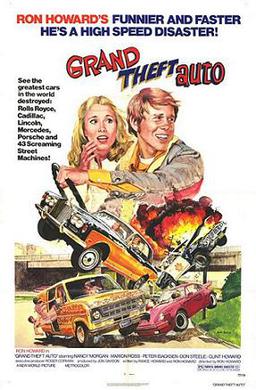
Grand Theft Auto is a 1977 American road action comedy film starring and directed by, in his feature film directorial debut, Ron Howard, who also wrote the screenplay with his real-life father Rance Howard, who also co-starred in the film. As of 2023, this is the only film that Howard has both directed and starred in. The film takes its title from the crime grand theft auto, which is committed a number of times by several different characters.

The Great Locomotive Chase was a military raid that occurred April 12, 1862, in northern Georgia during the American Civil War. Volunteers from the Union Army, led by civilian scout James J. Andrews, commandeered a train, The General, and took it northward toward Chattanooga, Tennessee, doing as much damage as possible to the vital Western and Atlantic Railroad (W&A) line from Atlanta to Chattanooga as they went. They were pursued by Confederate forces at first on foot, and later on a succession of locomotives, including The Texas, for 87 miles (140 km).

A handcar is a railroad car powered by its passengers, or by people pushing the car from behind. It is mostly used as a railway maintenance of way or mining car, but it was also used for passenger service in some cases. A typical design consists of an arm, called the walking beam, that pivots, seesaw-like, on a base, which the passengers alternately push down and pull up to move the car.
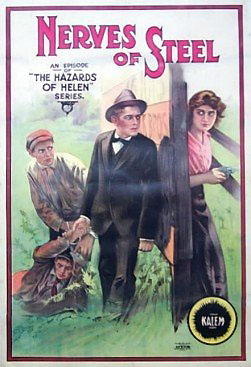
The Hazards of Helen is an American adventure film serial of 119 twelve-minute episodes released over a span of slightly more than two years by the Kalem Company between November 7, 1914, and February 24, 1917.

Stacey Sutton is a fictional character in the 1985 James Bond film A View to a Kill. She is played by Tanya Roberts.
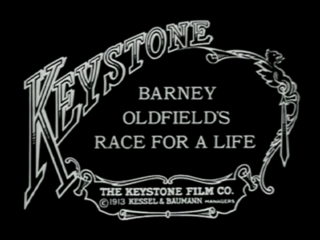
Barney Oldfield's Race for a Life is a 1913 silent comedy short, directed and produced by Mack Sennett. It stars Sennett, Mabel Normand, Ford Sterling, The Keystone Cops and Barney Oldfield as himself, in his film debut. It was distributed by the Keystone Film Company, and released in the United States on June 3, 1913. The film is preserved and was released as part of a DVD box set, titled Slapstick Encyclopedia, and is frequently featured in silent film festivals.
Joseph Graybill was an American silent film actor. He appeared in several films directed by D.W. Griffith.

The Lonedale Operator is a 1911 short American drama film directed by D. W. Griffith, starring Blanche Sweet and written by Mack Sennett for the Biograph Company. The plot of the film involves a girl who takes over a telegraph station after her father takes ill. After the payroll for the town's mine is delivered, two drifters try to steal the money. Their robbery is foiled because the girl is able to telegraph for help and then hold the would-be robbers off until help arrives. The Lonedale Operator includes "elements of romance, drama, suspense, Western, and even a bit of comedy near the end."
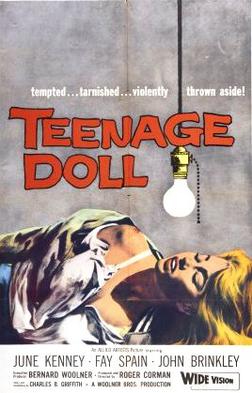
Teenage Doll is a 1957 film noir directed by Roger Corman, starring June Kenney and John Brinkley. It was financed by Lawrence Woolner, who had previously made Swamp Women with Corman. One writer called it Corman's "most impressive teen flick".

Joyride is a 1977 adventure film directed by Joseph Ruben. The screenplay was written by Ruben and Peter Rainer.

The Order of Railroad Telegraphers (ORT) was a United States labor union established in the late nineteenth century to promote the interests of telegraph operators working for the railroads.
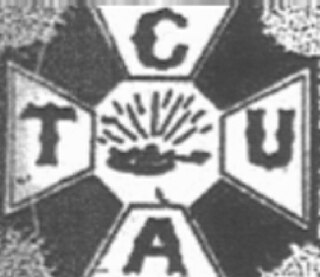
The Commercial Telegraphers Union of America (CTUA) was a United States labor union formed to promote the interests of commercial telegraph operators.
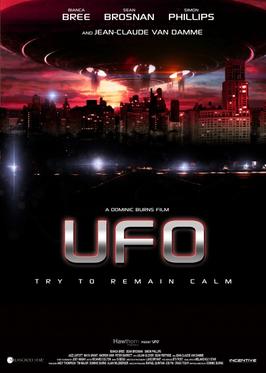
U.F.O. is a 2012 British science fiction film about an alien invasion, written and directed by independent British filmmaker Dominic Burns. It stars Bianca Bree, Sean Brosnan and Simon Phillips. U.F.O. was filmed in Crabtree Close, Allestree, Derby.
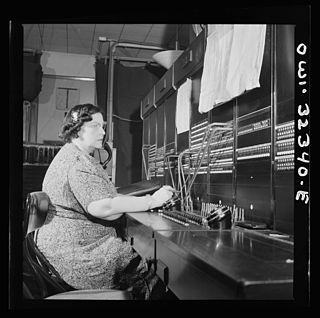
Women in telegraphy have been evident since the 1840s. The introduction of practical systems of telegraphy in the 1840s led to the creation of a new occupational category, the telegrapher, telegraphist or telegraph operator. Duties of the telegrapher included sending and receiving telegraphic messages, known as telegrams, using a variety of signaling systems, and routing of trains for the railroads. While telegraphy is often viewed as a males-only occupation, women were also employed as telegraph operators from its earliest days. Telegraphy was one of the first communications technology occupations open to women.
The following is a list of films by Edwin S. Porter, head producer at the Edison Manufacturing Company owned by Thomas A. Edison, between 1900 and 1909. Later films were produced at the Rex Motion Picture Company and Famous Players Film Company.

The Last Stagecoach West is a 1957 American Western film directed by Joseph Kane and starring Jim Davis, Mary Castle, Victor Jory and Lee Van Cleef. The film's art direction was by Ralph Oberg.

Rails Into Laramie is a 1954 American Western film directed by Jesse Hibbs and written by D.D. Beauchamp and Joseph Hoffman. The film stars John Payne, Mari Blanchard, Dan Duryea, Joyce Mackenzie, Barton MacLane and Ralph Dumke. The film was released on April 14, 1954, by Universal-International Pictures.

The Train Wreckers is a 1905 American silent drama film, directed by Edwin S. Porter. In the film, the daughter of a railway switchman and lover of a locomotive engineer defeats outlaws trying to derail a train.
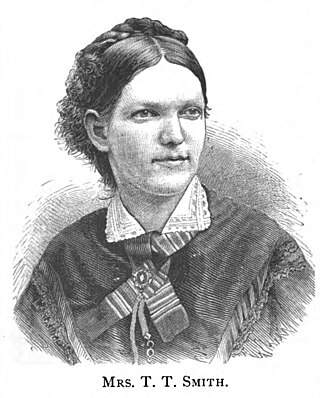
Emma A. Hunter (1831–1904) was an American telegraph operator from West Chester, Pennsylvania. She was hired by the Atlantic and Ohio Telegraph Company in 1851 and worked as a telegrapher until 1868. She is known as the second female telegrapher in Pennsylvania, preceded only by Helen Plummer of Greenville in 1850. Although she was widely noted in her lifetime as the first female telegrapher in the United States, historical research has shown she was not. However, she may have been the first telecommuter, as Thomas Jepsen has argued.
References
- ↑ D.W. Griffith, The Girl And Her Trust , retrieved 2021-11-27
- ↑ "The Girl and Her Trust (Film, Thriller): Reviews, Ratings, Cast and Crew - Rate Your Music". rateyourmusic.com. Retrieved 2021-11-27.